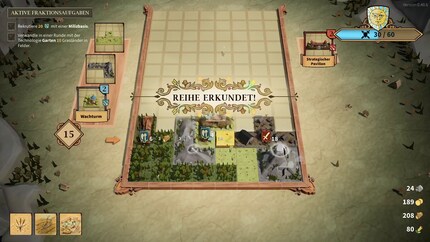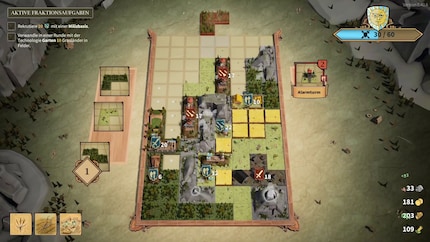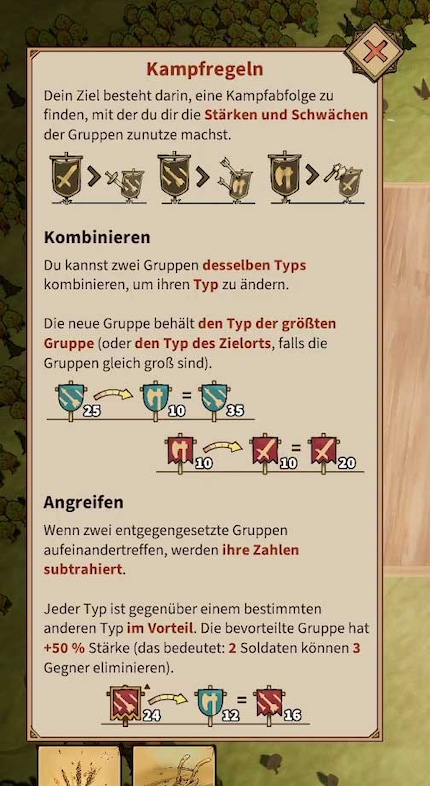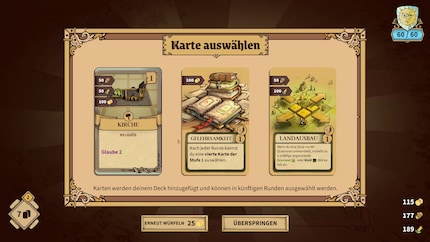
Review
MIO: Memories in Orbit is a visual masterpiece
by Kevin Hofer

Drop Duchy combines the concepts of Tetris and Catan into a roguelite. Crazy combinations and beautiful graphics make it really motivating – if only it weren’t for the repetitive battles.
In art, everything eventually becomes no more than a reference. Literature’s long since written the greatest stories, whether it’s love, power, betrayal, guilt, hubris or catharsis. Authors have been repackaging the same narratives since ancient times, and films have been referencing themselves for decades. Without Akira Kurosawa, there’d be no Star Wars. Without Satoshi Kon, there’d be no Inception. Without Jean-Luc Godard, there’d be no Taxi Driver.
Video games also adopted referencing as a stylistic device decades ago. Entire genres are named after their source of inspiration (Metroidvania, Balatrolike, or Soulslike) and immediately identify imitators trying to cash in.
Now, with Drop Duchy, a typical example of the «familiar formula, new game» trend is on the horizon. In this case, Tetris and Catan are blended into a roguelite deckbuilder in a medieval setting. I imagine the developers throwing a dart at a board listing the most successful game concepts of the past few decades. Why not a bullet-hell-rhythm game in a zombie setting…?
The concept behind Drop Duchy’s a simple one. Pieces fall like in Tetris, only here they’re landscapes like forests, fields, or rivers. I build a medieval landscape, piece by piece. When a line’s complete, it doesn’t disappear like in Tetris. Instead, I receive the corresponding resources: wood for forests, grain for fields, stone for mountains. I need them for the deckbuilding part of the game.

In addition to the landscape pieces, unique buildings also randomly drop from above. These give you special bonuses or even recruit an army. Before each game, you can select a number of these buildings and strategically assemble your deck.
If you’re expecting a lot of enemies, focus on military buildings. If there are no enemies in sight, try to gather as many resources as possible. Because you unlock more and more new cards and mechanics as the game progresses, Drop Duchy is always varied. Suddenly, wood can be converted into fields, where I can then plant grain, which then benefits my watchtower, which can recruit more fighters.
The goal’s always the same in normal mode. You have to survive through three levels, choosing between predefined paths to see if enemies await on the next board and what resources you can expect. Now and then, you can trade at the market or research upgrades at the university. I do this until I reach the end of the level, where a particularly difficult boss awaits. Which brings us to the somewhat dull combat system.
Certain buildings produce different units, and special properties enable you to try to maximise the number. For example, it might say: «Produces five heavy units for each adjacent military building.» So, I try to place as many military buildings next to each other as possible.

This makes things tricky, as there are enemy military buildings among my Tetris pieces. I have to place them on my map as well. And the enemy military buildings also have bonuses, which is why I have to be extremely careful not to negate my own bonus with a badly placed building.
Once the last piece has been placed or the board’s full to the brim, battle begins. I determine the order in which my troops attack or defend. At the end, every unit on the field has to have been involved in the battle. Following the rock paper scissors principle, swords beat bows and arrows, but are weak against axes.

While this may sound confusing, in practice it quickly becomes boring and lacks tactical depth. It always comes down to me having the same number of units or more, forcing my opponent to their knees. Then I can choose a new card from three randomly revealed cards and boost my power.
If the opponent wins, they deduct defence points from me based on the number of remaining units. I start with a set number of defence points. If I run out, the run ends and I start again. I retain certain achievements, but I lose my deck and other bonuses with each run.

Later on, additional factions are added – each with significantly different gameplay – and I keep unlocking new maps and mechanics, but the combat system stays largely unchanged. A run can quickly end in disaster because the random generator spits out the wrong military cards. This makes Drop Duchy increasingly complex without completely overwhelming me. The randomness also forces me to constantly develop new strategies, which keeps me entertained in the long term.
_Drop Duchy’s available for PC on Steam. The game was kindly provided to me by the developer.
Pro
Contra
When I flew the family nest over 15 years ago, I suddenly had to cook for myself. But it wasn’t long until this necessity became a virtue. Today, rattling those pots and pans is a fundamental part of my life. I’m a true foodie and devour everything from junk food to star-awarded cuisine. Literally. I eat way too fast.
Which films, shows, books, games or board games are genuinely great? Recommendations from our personal experience.
Show all